It was probably asking for trouble, planning to launch a new radio station on April Fools Day, but that is what they did. 1st April 1966 was set as the start date for Yorkshire's first and only
offshore station. But fate intervened. Delayed first by the non-arrival of technical equipment from the States, the collapse of the aerial mast in a gale was even more serious and ensured that it would be weeks
before the ship would be ready to start broadcasting. Finally, two months late, Radio 270 began test transmissions on 4th June 1966. At last, the north-east of England was about to experience the excitement of
commercial pop radio.
|
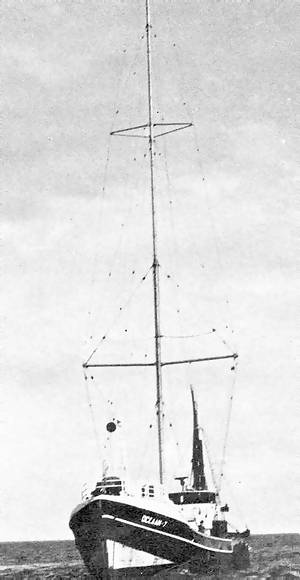
|
|
Radio 270's ship mv Oceaan 7.
|
The station was set up by promoter Don Robinson. He interested a local fisherman, Bill Pashby, and farmer Roland Hill. Together they spread the word and eventually around fifty or sixty local people
invested in the project. They appointed supermarket magnate Wilf Proudfoot as Managing Director. The company chairman was Leonard Dale who owned a generator manufacturing company. A Dale generator provided the ship's
power.
A Dutch fishing boat, the Oceaan 7, was bought to house the station. The smallest of all the pirate ships, she was 139 feet long, weighed 160 tons and was refitted for her new role in the Channel Islands. Compared
to other radio ships, 270 was set up remarkably cheaply. The total cost of converting the vessel and installing the equipment came to around £75,000.
|
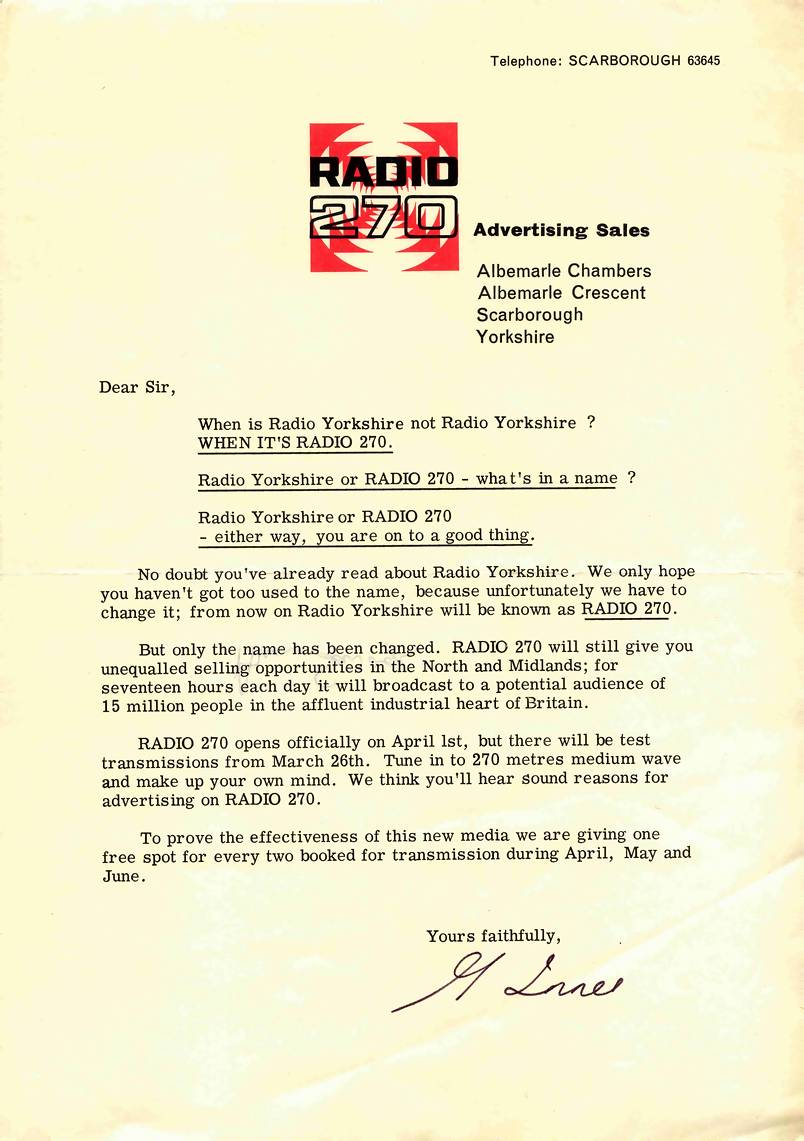
|
|
Letter announcing the name change, kindly provided by Guy Hamilton. Click to magnify.
|
The station was originally to be called Radio Yorkshire and a certain amount of pre-launch publicity was issued using that name. Then the management team heard from a Shipley-based company who had
already registered the Radio Yorkshire trade name. A new identity was required. The station became Radio 270, named after its wavelength. A letter was sent to potential advertisers informing them of the change, see
left.
The station's first Programme Director was Roger Gale. A former Caroline disc-jockey, he had recently helped launch Radio Scotland. The initial plan was for a combination of live and
pre-recorded shows. Television announcer Len Martin and journalist Stacey Brewer would record their shows on land, Roger would be on the ship with fellow disc-jockeys Paul Burnett, Hal
Yorke, Andy Kirk, Allen Ives and Bob Dewing. Unfortunately the collapse of the mast and the delayed launch meant that these last two had departed before the station had even begun.
By the time of the first broadcast, Australian ‘Neddy’ Noel Miller had been appointed Programme Director and Roger Gale had become Senior DJ. His was the first voice heard on day
one although Roger did not stay with the station for long. By the time of the publication of the 270 Set booklet, the DJ line-up consisted of Noel with Paul
Burnett, Hal Yorke and Andy Kirk from the original team plus Dennis Straney and Alex Dee from
Radio City, Pete Bowman from Radio Scotland, Roger Keene from King Radio and Leon Tipler who had previously enjoyed a brief
stay on Radio City. Regular programmes began on 11th June 1966.
Radio 270 broadcast on 1115 kilohertz, 269 metres, with a 10 kilowatt RCA transmitter from 7am to midnight (extended to 1am soon afterwards).
We asked a number of former 270 staffers for their memories of the station. We start with one of the first DJs to be hired, Paul Burnett:
|
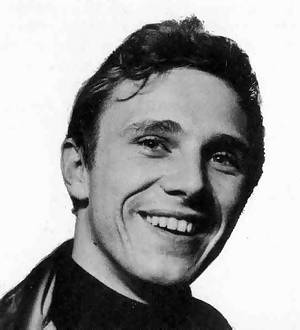
|
|
Paul Burnett.
|
“I had bought myself out of the RAF and was living with my mother in Darlington. I remember taking the train to Scarborough to join Radio 270. I had to change trains at
York. In the waiting room was this very swashbuckling glamorous looking guy. I thought he must be an actor or something. When the train got to Scarborough, I went to Don Robinson's office and there was the same man. It
turned out that he was Roger Gale. We became good friends. He was quite a character.
The original plan was for the station to be like the BBC Light Programme. I can remember wandering around factories, interviewing people for a sort of Down You Way type show. I don't think any of the interviews
were ever used. By the time we went on the air, the decision had been made that the station should be Top 40.
I was on the ship when the mast came down and it was seriously terrifying. There was a clear blue sky but the waves were just enormous. The mast snapped off about two-thirds of the way down. It was my first day at sea
and I was extremely sea-sick. The top part of the mast was waving around and the crew had to try to cut it all free. We were very worried that it might tip the ship over. I thought it would be the end. I was very
impressed with Roger Gale. He was out there with the crew helping to cut the aerial free as these steel hawsers whipped around the deck.
After the mast collapsed, there was a delay of two months. I didn't have another job to go to. I had left the RAF so I offered to stay on board the ship as sort of night-watchman, with Hal Yorke, while the ship was
being repaired in Grimsby. (Hal's pictures here.) It wasn't much fun but I am glad I did it because, when the station finally made it onto the air, the other DJs who had originally been
hired weren't brought back. If I hadn't volunteered to look after the ship, I might never have got on the radio. My life would have been totally different.
Noel Miller had been on 2UE Sydney and had more radio experience than the rest of us. He was a good bloke but maybe took himself and his position as Programme Director a bit too seriously. His fellow Aussie, Dennis
Straney, was totally the opposite. He didn't take anything seriously. A great guy and a real rascal. One day we played a practical joke on Noel. We were all involved but Dennis was probably the ring leader. We were
all young guys and, when we weren't on the air, we had time on our hands. We filled a cylinder vacuum cleaner with baking powder, hid the nozzle in the studio behind the microphone, switched the controls from
‘suck’ to ‘blow’ and trailed the power cable into the next door studio. We were all watching through the window. Neddy Noel used to take a tray of toys into the studio with him, squeaky things
and rattles to use as props. He was in the middle of saying something and we threw the switch. But nothing happened. There was a bit of a noise but that was all. We had crammed the powder in too tight. Neddy made a
comment about the noise when suddenly everything went white. It just exploded. He was coughing and spluttering and all we could see through the window was total white! We hurried back to the mess room and acted
innocent when Noel came stomping in, covered from head to foot in baking powder. Dennis looked up and said ‘Hi Noel. I didn't know you were into flour power!’ Unfortunately the powder had got into the
mixing desk which put us off the air. Dennis had always been very vocal, complaining about the food, the conditions on the ship, etc. and this was the last straw. He was fired. He had been right though. The conditions
were poor. We all agreed with him and quit in solidarity. After a bit of debate, in which we were able to air our grievances, we were all re-hired. The conditions improved, they changed the DJ shift pattern to one
week on, one week off and the food got better. A lot of good came out of that practical joke. Although Dennis was fired again a short time later so he didn't really see the benefit.
|

|
|
A Radio 270 car sticker, price one old penny in aid of charity.
|
In November 1966 there was another terrific storm. I wasn't on the ship for that one, thank God, but I was listening at home and it was just horrific. We had those heavy night
storage heaters on the ship, very heavy things welded to the wall. It was so rough that night that they were torn loose and were flying around as the ship rolled. They did a lot of damage. The captain was used to deep
sea conditions and, when you are in a storm like that out at sea, the normal way of dealing with it is to steer the ship into the storm. So that is what he did. The studio and living quarters were all below the
water-line so there was sea water getting in. Waves were crashing over the deck, everything was been thrown around violently. The DJs on board were absolutely terrified. When it was finally all over, they were
interviewed by the press. They said that they felt unsafe on the ship. One of them described it as a ‘death trap’. They were all promptly fired.
Wilf Proudfoot, the Managing Director, didn't have much regard for disc-jockeys. When we weren't presenting shows, he expected us to be doing odd jobs on the ship - chipping rust, painting, etc. I remember being with
him just after the three DJs had been fired, after that storm. He was saying things like ‘anyone can be a DJ’. There was a young spotty lad there, probably about 17, delivering groceries. Proudfoot turned
to him and said ‘Ee lad, do you fancy being a disc-jockey?’ The boy rather hesitantly said that he did so Proudfoot hired him and sent him out to the ship - to do the Breakfast Show! He was only there a
week. He went off on leave at the end of his first stint and we never saw him again.
With the Government making noises about legislating against the pirates, I could see that the writing was on the wall. I didn't want to hang around until the end because, even if the BBC did start a pop music station,
there would be dozens of disc-jockeys all trying for very few jobs. So, when Manx Radio offered me a job in 1967, I decided to take it. I flew to the Isle of Man and, while I was there, saw the boat that was used to
tender Radio Caroline North. It looked exactly like the Oceaan 7. We were broadcasting from a vessel that was the same size as Caroline's tender!”
 Paul Burnett, early in his career on Radio 270, June 1966. Tape courtesy of Guy Hamilton (duration 2 minutes 9 seconds)
Paul Burnett, early in his career on Radio 270, June 1966. Tape courtesy of Guy Hamilton (duration 2 minutes 9 seconds)
|
 Noel Miller on Radio 270 in 1966. Recording generously provided by Martyn Webster (duration 4 minutes 59 seconds)
Noel Miller on Radio 270 in 1966. Recording generously provided by Martyn Webster (duration 4 minutes 59 seconds)
|
 Roger Keene on Radio 270, 24th December 1966. Recording courtesy of www.azanorak.com (duration 1 minute 6 seconds)
Roger Keene on Radio 270, 24th December 1966. Recording courtesy of www.azanorak.com (duration 1 minute 6 seconds)
|
 Alex Dee on Radio 270, September 1966. This recording provided by Manfred Steinkrauss (duration 3 minutes 52 seconds)
Alex Dee on Radio 270, September 1966. This recording provided by Manfred Steinkrauss (duration 3 minutes 52 seconds)
|
Next up with his memories, it is Programme Director ‘Neddy’ Noel Miller:
|
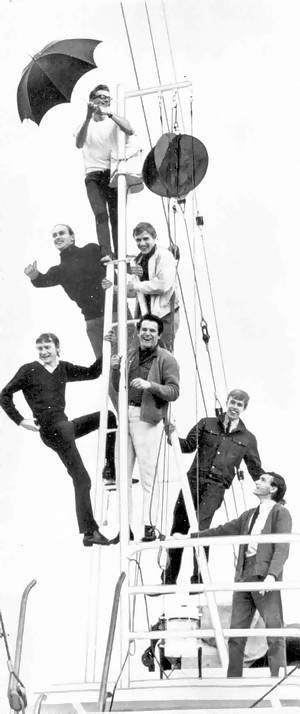
|
|
An early DJ line-up. Hal Yorke at the top, Noel Miller and Paul Burnett below, Alex Dee and Dennis Straney below them, then Andy Kirk with Pete Bowman on the deck.
|
“In 1965, while working at 2UE in Sydney, a producer friend of mine at the ABC suggested I try my luck in Britain with the BBC. So, with nothing but a few names,
not many dollars, and my wife (at the time) Carole, arrived in England in early 1966. I did several auditions for the BBC but nothing was likely for at least six months. Meanwhile Carole got a job with Pye Records and
met up with Artist Manager, Cyril Stapleton.
Cyril could not be involved in offshore radio because of his position with Pye Records but his wife had an interest in 270, along with his friend Wilf Proudfoot who was one of the main shareholders. Proudfoot, who
was a local MP and also owned a couple of supermarkets in Scarborough, was unhappy with the way the radio station was taking shape. The format was similar to the BBC and he wanted more of a ‘pop’ format.
Cyril mentioned my Australian radio experience to Wilf and a meeting was arranged. Wilf employed me as Program Director and within a week I found myself living in Scarborough putting together a format and a bunch of
DJs.
The sound was as good as any pop radio around and the team was fantastic! Radio 270 was never anything but pop radio with a Top 40 format and some oldies. The dramas of putting together this venture would make a
brilliant TV series, with the British Government trying to close us down, clandestine maintenance trips to shore, and tender vessels not much bigger than a dinghy. Life was never dull. The boat was a Dutch trawler
registered in the Honduras in my name (a non-British person). Some DJs saw the ship and returned immediately to shore, never to be seen again! However I find it quite amazing how many DJs claim to have worked on 270.
We had fish feasts beyond belief when trawlers pulled alongside and gave us baskets of seafood in exchange for playing their requests. We went through a lot of cooks. Some couldn't handle the weather and some just
couldn't cook! One of them, Little Norman, had been involved in a collision at sea, and consequently used to pace the deck during foggy weather ringing a bell. (We were not far from the shipping lane.)
Once during a violent storm the then Captain, whose experience was limited to a barge on the Hudson River in Canada, came below, put his head in his hands at the mess table, and stayed there. It was our technician
Henry and the crew who saved the boat, even though, after the storm had passed, nobody knew where we were.
Then there was the DJ Revolt, led by Dennis ‘The Menace’, which was resolved after I met with him (he was a fellow Aussie). We agreed to a week on, week off the ship (originally it was 2 weeks on 1 off) with
the same pay.
The studio set-up was very basic with two turntables and two tape decks, the turntable was set on a gimbal to keep it level. It certainly made us aware of the boat's movement when it was almost at right angles to the
rest of the studio.
With only one studio all recording had to be done after closing so the hours were long. The news came from the BBC, recorded then rewritten for our shorter bulletins. All announcers had two on-air shifts plus news
duty as well as extra responsiblities like cleaning, filing, music catalogue etc. so there wasn't much spare time. Recreation included fishing, darts, cards, watching TV. Most memorable TV.... England's World Cup
victory.
Would I do it again?...When can I start?”
| RADIO 270 PROGRAMME SCHEDULE 1966 |
| weekdays
|
Unlike other stations, Radio 270 had two completely separate teams of DJs. This meant there were two schedules, depending on which team was on board.
6.30am Leon Tipler or Paul Burnett
9.00 Dennis “The Menace” Straney or Roger Keene
12.00pm “Neddy” Noel Miller or Pete “Boots” Bowman
2.00 Dennis “The Menace” Straney or Roger Keene
4.00 “Neddy” Noel Miller or Pete “Boots” Bowman
7.00 Hal Yorke or Paul Burnett
9.00 Andy Kirk or Alex Dee
12.00am “The Midnight Hour”
1.00 closedown
Information from Offshore Radio by Gerry Bishop, published by Iceni Enterprises.
|
Life on board the Oceaan 7 was not comfortable. It was a tiny ship, anchored in stormy waters, and staff turn-over was high. As Paul has already mentioned, in November 1966 the ship endured a massive storm that
terrified the occupants. The DJs who were on board at the time, Leon Tipler, Andy Kirk and Alex Dee, told their story to the press - and were promptly sacked. A new batch of presenters were taken on, including
Mike Hayes who had previously been involved in forces broadcasting with Paul Burnett in Aden and two former DJs from Radio Essex, the small fort-based station which was nearing the
end of its life. David Sinclair was one of them:
|
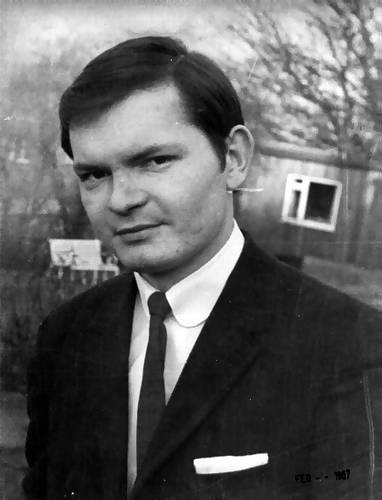
|
|
David Sinclair.
|
“Although the strict order of events are now a trifle hazy, I suspect that it was entirely due to (Radio Essex and 270) engineer Keith
Robinson that I landed up with Radio 270. Broadcast engineers are a close-knit and somewhat subterranean breed, all in a special world of their own. But what is important is that they communicate. And they do it
with frequency! Keith had got wind of the fact that 270 was in need of a technician and, in the course of conversation, it transpired that they also needed several new on-air staff. It would seem there had been a mutiny
of sorts....
Keith passed on the good news to myself and Roger Scott for whom this opportunity was right on time. I don't think we even discussed money or anything else. We simply knew that Radio 270 was
on a ship and was broadcasting up north off the coast between Scarborough and Bridlington in the county of Yorkshire. Keith simply asked if we fancied the gig, we said yes, and off we went.
The station was housed on an old Dutch fishing boat called the Oceaan 7, a vessel of only 160 tons. The ship was positioned about three or four miles off the coast of eastern England, floating around between Scarborough
and Bridlington, depending on weather conditions and the Captain's predilections for deep sea fishing. As I found when I joined the station, the ambience of fish, both ancient and modern, still permeated the ship to a
considerable degree, in spite of thorough cleaning and refurbishing. After the sense of space we had enjoyed on the Radio Essex fort, the narrow confines of life on the Oceaan 7 could easily drive one demented. What
had once been the main hold, in the centre of the ship, became the dining and sleeping area for the inhabitants. At least, it was the sleeping area for the jocks, and the dining area for the jocks AND the crew. Picture
if you will the main living room in an average suburban single family home. Then picture a large square dining table and benches in the middle, and then a series of bunk beds down the two sides, leaving the front and
back ends of the room for people to manoeuvre in and out of the room, or congregate for spirited discussions on the merits of various football teams. To put things in a nutshell, you could enjoy breakfast in bed simply
by putting your hand through the drapes fronting your bunk and remove someone's plate of food from the table. Yes, it was that close! And, in poor weather, you could simply lie back and wait for the plate to arrive in
your bed without any help from anyone.”
 David Sinclair on The Midnight Hour in January 1967, a studio recording kindly donated by the man himself (duration 3 minutes 58 seconds)
David Sinclair on The Midnight Hour in January 1967, a studio recording kindly donated by the man himself (duration 3 minutes 58 seconds)
|
 The Rolling Stones, The Creation and Earl & Dean pass on their greetings via Radio 270. Tape kindly provided by Guy Hamilton (duration 57 seconds)
The Rolling Stones, The Creation and Earl & Dean pass on their greetings via Radio 270. Tape kindly provided by Guy Hamilton (duration 57 seconds)
|
|
